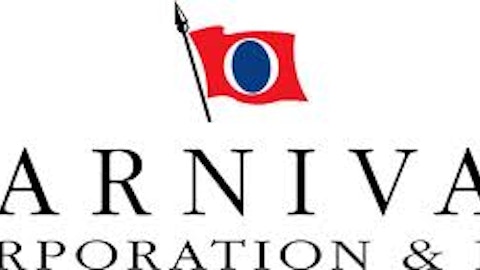
It’s tough to say that Carnival Corporation (NYSE:CCL) will suddenly right the ship and become a slow and steady winner. What’s more likely, is it will experience more volatility and more underperformance. Still, let’s take a look just to be sure.
Most news is bad news
In this industry, investors don’t want to see a cruise line making news, because it usually means there has been another incident at sea. Carnival Corporation (NYSE:CCL) might be the largest cruise company in the world, with a market cap of around $29 billion, but its name is also associated with many incidents, including:
Costa Concordia: Tragic accident off West Coast of Italy (led to reduced bookings)
Carnival Dream: Lost power, toilets not operational
Carnival Elation: Failed steering mechanism
Carnival Triumph: Engine fire, adrift in Gulf of Mexico for 4 days
Carnival Splendor: Fire
These incidents have adversely impacted Carnival’s reputation. And while it would be nice to report good news and quality management, many passengers have complained about the way some of these events were handled.
Carnival Corporation (NYSE:CCL) saw its top and bottom-lines decline in 2012, after two years of improvement. The good news is that Carnival is capable of navigating its way through these stormy waters. With an industry-best net margin of 9.79%, around $3 billion in operating cash flow, and the stock trading at 20 times earnings, the fundamentals are mostly sound. Carnival also yields 2.70%.
Short term, Carnival is facing two big headwinds. One, marketing and promotions have increased in order to boost ticket sales. This, in turn, has the potential to negatively impact margins and earnings. Two, the broader market looks to be frothy at the moment.
Approximately 40% of earnings growth has come from stock buybacks, not organic growth. If interest rates increase and companies stop borrowing money on the cheap in order to buy back their own shares, then there will be a flight to quality. Unfortunately, Carnival Corporation (NYSE:CCL) doesn’t fit into that category.
Related options
Royal Caribbean Cruises Ltd. (NYSE:RCL) is the second-largest cruise company in the world, with a market cap around $8.5 billion. Its fleet might not be as large as Carnival, but its ships are bigger. This allows for more revenue per ship. Royal Caribbean Cruises Ltd. (NYSE:RCL) has seen increased bookings and higher ticket yields, but optimism might be irrational considering the stock is trading with a high earnings multiple.
One of the great aspects of Royal Caribbean Cruises Ltd. (NYSE:RCL) is its geographic diversification. With exposure to Latin America, Europe, Australia, and North America, strength in one market has the potential to make up for weakness in another.
Royal Caribbean Cruises Ltd. (NYSE:RCL) has consistently improved revenue over the past three years, but earnings declined in 2012. With a net margin just shy of 1%, there isn’t much room for error, and a fire on the Grandeur of the Seas didn’t help matters.
Royal Caribbean Cruises Ltd. (NYSE:RCL) currently yields 1.30% and with a relatively healthy debt-to-equity ratio of 0.99, the dividend looks to be sustainable for the near future.
Norwegian Cruise Line Holdings Ltd (NASDAQ:NCLH) recently beat second-quarter earnings expectations and upped its full year adjusted EPS guidance to $1.30 to $1.40 from $1.20 to $1.40.
In the second quarter, net revenue jumped 12% year-over-year, thanks to the addition of the Norwegian Breakaway (new ship) and increased ticket prices. It has also refinanced debt to improve its balance sheet.
Currently, Norwegian Cruise Line Holdings Ltd (NASDAQ:NCLH) owns a debt-to-equity ratio that’s higher than industry average. It does not pay a dividend, which is smart considering the company’s leverage situation. However, the stock is still trading with a super earnings multiple, which makes it a risky investment.
Conclusion
Despite all the drama, Carnival Corporation (NYSE:CCL) is still likely to offer the best long-term investment of this group. It’s by far the largest, which has led to stronger brand recognition and more resiliency to larger market corrections (relatively speaking). A high net margin and a safe dividend make Carnival somewhat appealing.
But the business is sensitive to market corrections and another at-sea incident would crush the stock. Though Carnival might offer some upside potential, the risks outweigh the rewards. Do your own due diligence, but perhaps it’s best to avoid this industry altogether.
The article Should You Buy Tickets for This Carnival? originally appeared on Fool.com and is written by Dan Moskowitz.
Dan Moskowitz has no position in any stocks mentioned. The Motley Fool has no position in any of the stocks mentioned. Dan is a member of The Motley Fool Blog Network — entries represent the personal opinion of the blogger and are not formally edited.
Copyright © 1995 – 2013 The Motley Fool, LLC. All rights reserved. The Motley Fool has a disclosure policy.





